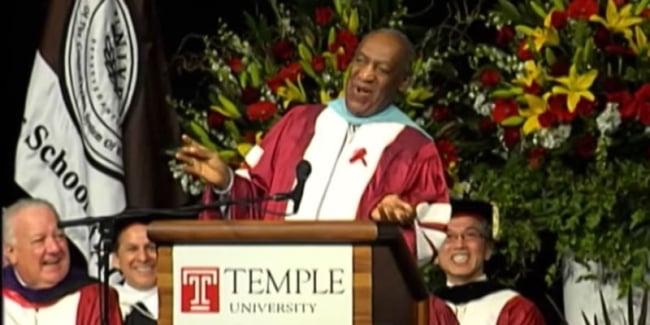You have /5 articles left.
Sign up for a free account or log in.

Bill Cosby speaking at a Temple University commencement in 2012.
Temple University
This past week saw two separate rape stories emerge in national media. First, rape allegations against Bill Cosby reached a critical mass, as more and more women stepped forward to tell their stories of sexual abuse at the hands of the revered comedian and TV star. Second, Rolling Stone published an account of fraternity gang rape at the University of Virginia, where the university’s response was almost as horrific as the attack itself. The U.Va. story epitomized a growing conversation this year about epidemic levels of sexual violence at colleges and universities in the United States.
These stories are not related, beyond reflecting two facets of an American rape culture that seems more pervasive and systemic every day. Their simultaneous appearance does offer an opportunity for a significant portion of the American higher education system to make a statement about their commitment to addressing and changing the culture that surrounds rape on campus.
Boston University, Marquette University, Virginia Commonwealth University, Carnegie Mellon University, the Berklee College of Music, Baylor University, Yale University, Sisseton Wahpeton College, West Chester University, Haverford College, the Rensselaer Polytechnic Institute, Amherst College, Colgate University, the University of Southern California, the University of Connecticut, Swarthmore College, and the University of Pennsylvania have awarded Bill Cosby an honorary doctorate. It’s time for these colleges to rescind the honors they gave to Cosby, who, it grows clearer by the day, has engaged in a lifelong pattern of sexual abuse and exploitation.
On one level, who cares about the degrees? It’s hard to see what impact losing these honors would have on a 77-year-old multimillionaire unlike ever to face prosecution for any of these alleged crimes. Rescinding the degree is a symbolic gesture. Awarding the degree in the first place was a symbolic gesture.
It is also possible to steal a page from the Penn State playbook and warn against a “rush to judgment.” Like any suspect in a potential criminal case, Cosby is entitled to due process. But stripping honors away from someone is not the same as putting him in jail. As Ta-Nehisi Coates pointed out on Friday, “If we had to sit around and wait for courts to make basic judgments about people, society would collapse onto itself.”
The reason to take away these degrees has little to do with Cosby himself. Unfortunately, he will be fine. He will probably even able to continue a standup career, considering that he performed a sold-out show to a supportive audience as recently as Friday the 22nd, after at least a dozen women had made separate rape or abuse allegations against him. Instead, the confluence of the allegations against Cosby and our growing awareness of the extent of campus rape culture offers university leadership a chance to make a statement about their values. If they were to do so, they would be following the moral leadership of Nickelodeon’s TV Land, which has already pulled Cosby reruns from its schedule.
Rescinding these degrees would send a message that a university or college has a greater obligation to rape victims than to rape perpetrators. Rescinding these degrees would send a message to rape survivors on these campuses that presidents and trustees hear their voices. Taking away these honors from Cosby offers an opportunity for American higher education to take rape seriously.








